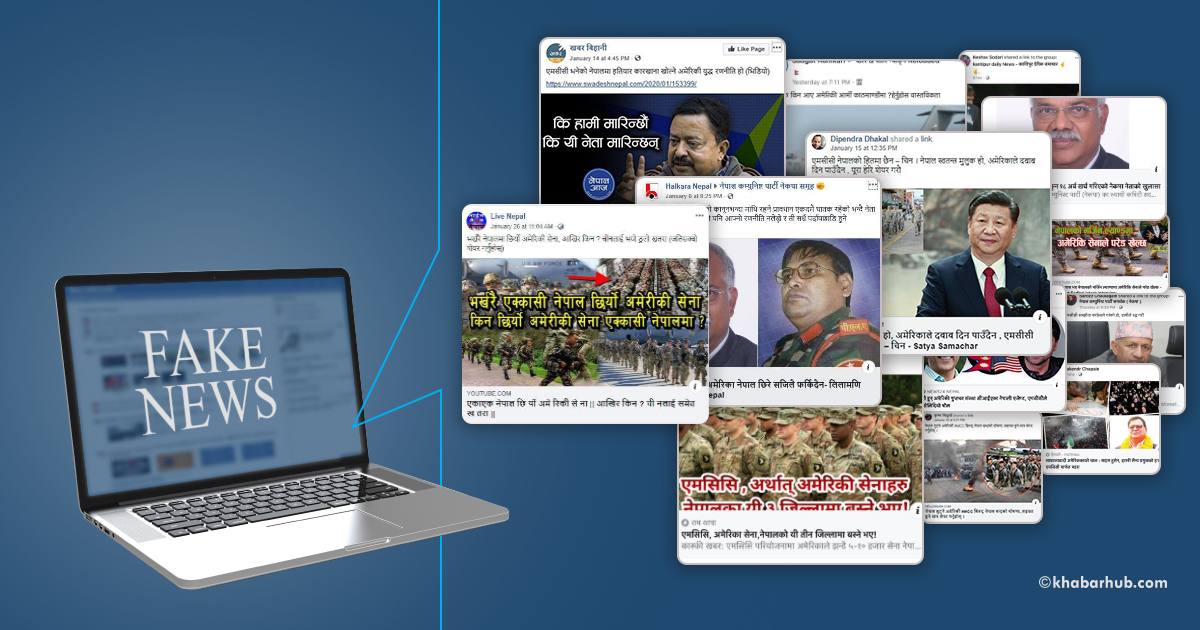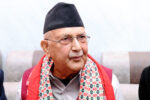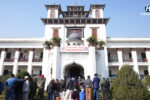KATHMANDU: There has been a growing sophistication of fake news on social media platforms and digital news portals about the widely-debated Millennium Challenge Corporation (MCC) Compact in Nepal of late.
Fake news on MCC is becoming a trending topic in Nepal. False stories, eye-popping headlines on MCC are difficult for the readers to evaluate or judge. Several of such fake news seem to have disseminated in the pretext of ‘nationalism’ with a narrow mission to discredit the US efforts and assistance to Nepal.
Not to forget the fact that MCC’s Nepal Compact is mainly designed to strengthening Nepal’s energy sector, improve regional energy connectivity, and control transportation costs to encourage growth and private investment. Nepal and the United States signed a $500 million compact to spur economic growth and reduce poverty in Nepal on September 14, 2017.
According to the MCC Nepal Compact, it aims at strengthening Nepal’s energy sector, improve regional energy connectivity, and control transportation costs to encourage growth and private investment.
Of late, digital sites have been flooded with false headlines, doctored photos, and videos. Fabricated and intentionally fictitious information is being presented in the guise of authentic news.
A substantial number of false news and stories posing as legitimate journalism are currently being disseminated to create confusion, to fulfill someone’s vested interests in the form of ‘conspiracy theory’. This is because it helps to trigger emotional response solidifying support within certain elements of the interest groups.
Professor P. Kharel opines that such fake news, though somehow damaging in the beginning, prove blunt very soon. He expects the Press Council Nepal to be more active.
Furthermore, fake news actually accelerates the process of polarization as most readers do not check the authenticity of the information source that they view online before sharing it.
Fake news is gradually emerging as one such menace related to MCC. Credible content in Nepal has now been overshadowed by sensational fake news leading to polarization of the society.
Such news has been widely seen as a potent tool of waging an unethical war against MCC. When public opinion is manipulated, transmit propaganda poses misinformation, spreading distortion for political gains.
Some propaganda auxiliaries have been launched social media offensive against Nepali popular celebrities who are not speaking out against MCC.
Active misinformation use with dubious sources, intended to misinform, misguide and spread propaganda such news generator creates hoax headlines, graphics and content. Most of the fake news has been spread through Facebook making it difficult to distinguish the fake news and real for ordinary readers.
Following are the completely bogus news stories related to MCC that have multidimensional effects have been seen in the public mind:
Fake news 1: “The US finally spoke its mind about the US Army coming to Nepal…the plan is to gherao (surround) China by giving Nepal $500 to Nepal in grant.” It seems quite silly and imprudent, though!

It all seems flabbergasting. A section of the people guided by vested interest, spread messages, mainly fake news, quickly, fooling social media users, especially the elderly, the young and the less educated who are particularly susceptible, thus creating the perception that the topic is trending.
Readers then tend to believe that the issues on MCC Compact reflect the real ground, and create contrasting opinions or sometimes even a huge division in public opinion.
Fake news 2: Another platform ‘Live Nepal’ with two photos cropped to make one, announced, “US Army has entered Nepal, why did it come to Nepal? A threat for China.”

It even claimed that the USA had planned to ‘gherao’ (encircle) China by giving NRs 55 billion to Nepal!
Fake news 3: “Nepal faces the fate of Iraq if MCC is endorsed. This is just an example of the US army ‘checking’ Muslim women.”

Deliberate dissemination of fake news is aimed at misleading the common people about MCC saying that Nepal would ‘meet the fate of Syria or Iraq’.
Fake news 4: “Imperialism will prevail in Nepal if MCC is endorsed and implemented.”

Such a tendency can sometimes be damaging to society and even the state mechanism. MCC, of late, has become an instrument to be played upon by especially those people who are upset because they do not have any agenda to hang upon or go to their voters.
It has turned media frenzy — from children to grownups whoever has to show their ‘intellect’, are set to speak on it.
Fake news 5: “The US announced its strategy after widespread protests of MCC…to provide $500 million to Nepal. ”

A social media user and a propagandist personifying himself as “Mekendra”, and a ‘warrior’ comparing MCC with the US Army strategy claiming that Nepal would soon witness the presence of the US army if MCC is brought to here.
Fake news 6: “The Americans want to establish an ammunition factory in Nepal in the name of MCC.”

This propaganda ‘expert’ skillfully portrays his intelligence saying the US army would loot people’s property. This person has even tried to defend his party’s decision to call Nepal Bandh (general strike) if MCC was endorsed.
Fake news 7: “The provision that MCC Compact shall prevail over domestic laws is fatal for the country…”

This is yet another instance of an intellectual giving his spurious opinion merely to misguide the Nepali populace.
Now consider how statements of senior leaders of the ruling Nepal Communist Party such as Leela Mani Pokharel, Bhim Rawal, and others make an impact on the common people about MCC.
If former ministers made such comments irrespective of international practices in such agreements, just imagine, how far-sighted decisions could such people make during their ministerial tenure! A question to ponder.
The fact is, most of the international agreements are made in such a way that they prevail over any domestic law that is made after Nepal becomes a party to it; generally, the domestic laws referred in international treaties exclude constitutional provisions – as the constitution is the supreme law of the nation.
Fake news 8: A photo and its caption posted on social media by a social media ‘intellectual’ showing a tanker on the street saying: “Nepal will, too, meet this fate…”

Aware of the attempt of sanctifying other serious offenses and criminal activities by labeling them as the one planted by the USA or the government, Prime Minister KP Oli in his speech last week at the party’s Central Committee meeting stated that former Speaker Krishna Bahadur Mahara, when he was the Deputy Prime Minister and Foreign Minister during Sher Bahadur Deuba’s premiership, had consented the compact which was signed by the same cabinet in 2017.
Fake news 9: “Nepal will meet Irani General Soleimani’s fate if MCC is rejected.”

Some people trying to blanket Mahara’s rape case portrait him together with the recently killed Irani General Qasem Soleimani and former Iraqi dictator, Saddam Hussein. Even more, interestingly, some posts on social media and news online have shown the picture of Minister for Information Gokul Prasad Baskota saying: “Do you want to meet Soleimani’s fate?”
Fake news 10: A post on social media shows an Iraqi video and claims Nepal will be helpless like Iraq if Nepal’s Parliament endorsed the MCC.

Lately, the misinterpretation of a few of the clauses which were later made clear by the government and the US Embassy in Nepal is no more an issue as most of the criticism comes from the shallow remarks of those who have not gone through the document at all.
Fake news 11: A platform “Namaste Host” has alleged journalist-turned-politician Rabindra Mishra and television presenter Rabi Lamichhane – a vocal critic of political disorder, and corruption, among others as ‘agents’ of the United States.

The fact that Mishra and Lamichhane are in favor of endorsing the MCC from the parliament has exposed their loyalty towards their ‘master’.
Some propaganda auxiliaries have been launched social media offensive against Nepali popular celebrities who are not speaking out against MCC. Such groups and individuals have been launching threats, intimidation and harassment campaigns against popular celebrity Lamichhane, Nepal’s most popular journalist. Lamichhane’s news show popular “Sidha Kura Janata Sanga”.
Some radical elements colluded with politician-linked police officers wanted to tacit him some months ago accused of ‘abetting suicide,’ without any substantial evidence. The Chitwan District Court recently dismissed the case against him along with his colleagues. His widely popular research-based program exposes corruption and hollowness prevailing everywhere together with bringing people’s responses to such issues live.

Lamichhane and Mishra are among the few journalists in Nepal who dare to speak about the fundamental rights of the public such as freedom of speech, democratic values, open government and liberal values.
Khabarhub source claims some former-royalist attempted to influence him against the matter to provoke the public to collapse the system but he did not do so and stood behind the liberal democratic value.
They are also accusing him and playing blame games against him on social media platforms.
Fake news 12: With a highlighted photo of Chinese President, another platform called Satyasamachar.com’s news in Facebook platform mentions President Xi as saying, “Nepal is an independent country, the US cannot give pressure to it. The MCC is not in Nepal’s national interest.”

The fact, in this case, President Xi never mentioned anything like this during his visit and rather a few weeks after his visit to Nepal.
Sources say some hard-core Communists, former royalists and some so-called intellectuals have been hell-bent on collapsing the MCC project in Nepal as they believe that failure to endorse the MCC from the parliament would pave the way towards collapsing Nepal’s current political system.
The USA, China, UK, Russia, France, etc. also have their interest in their investment. In how many places have we invested with no expectation of return? Naturally, no investment is made without any purpose.
Most of such platforms lack credibility, and information such as real domain name, author, about us, and cited sources. They have been using false images, content, with a lack of writing standards. Some of them have even photo-shopped US army in Nepal!
But the circumstances and the history of MCC tell that this initiation was a response the US adopted as a measure to prevent the terrorists’ from tempting the poverty victims to be rebellious against the developed countries.
In other words, the history shows, it’s an investment in poverty alleviation project that works as an alternative plan to keep the world free from any terrorist attack like the one US witnessed in 2001, which made this power giant realize it must work to bring substantive positive impacts on people’s life.
What all these misconceptions have in common is they lack rationality, they are not text-based and all of them reveal the lack of comprehensive skill on their leader’s part, who brainwash their supporters for wrong reasons.
Nepal has not got any detection techniques for fake news yet. People also are not able to spot fake news as it is relatively new in the country.

Downright false information spread across Facebook poses a serious risk of distorting the truth so as to impair the understanding of the people.
Although they are also registered in the Press Council of Nepal, an autonomous and independent media regulatory authority of Nepal, the Khabarhub team could not find out the credibility of any publisher on those portals.
Although there is the provision of blacklisting and suspending the press pass, Shrestha thinks the regulating mechanism itself is lost somewhere as the Council has to forward it to the Department of Information and the latter has to forward it to the Ministry of Communication and Information Technology.
Most of such platforms lack credibility, and information such as real domain name, author, about us, and cited sources. They have been using false images, content, with a lack of writing standards. Some of them have even photo-shopped US army in Nepal!
Kishor Shrestha, the Acting Chairman of Nepal Press Council is aware of the circulation of such fake news in the society and holds the opinion about curbing it.
“It’s high time to curb the platforms that disseminate fake news,” Shrestha told Khabarhub. “Due to the wrong-intent of the people, the credibility of the media itself may be at stake.”
Although there is the provision of blacklisting and suspending the press pass, Shrestha thinks the regulating mechanism itself is lost somewhere as the Council has to forward it to the Department of Information and the latter has to forward it to the Ministry of Communication and Information Technology.
Unfortunately, the Ministry sometimes decides “looking at the face” of the journalists.
He said that the Council has proposed for a Press Council Bench which can act more rationally in such issues.
There are numerous manipulated images, twisted facts, false claims, manipulated documents, shared fake content claiming part of the MCC agreement.
Mostly such fake content is shared relatively among certain like-minded groups, through email and messages for amplifying it.

A massive disinformation manipulation has generated the division in public opinion on MCC.
Through that effort, fake news suspicion on MCC’s motive mostly talked about conspiracy hiding behind assistance. These are examples that fabricated news contains trends that spread like wildfire on social media platforms.
Fake news outlets use calculated methods that avoid detections from Facebook algorithms. Most of the fake news and disinformation are systemic and follow the same trend.
Consider what former DIG Hemanta Malla has to say. He has witnessed several victims who have gone to mental trauma due to such fake news. “Fake news threatens, misleads and troubles people in many ways,” Malla says adding, “It cuts adversely both ways: the security personals get misled, the victim suffers and sometimes takes to a fatal decision like committing to suicide.”
He opines that fake news related to the international community or other countries damages the image of the nation, hence, it deserves a full stop.
Meanwhile, Govinda Acharya, the President of the Federation of Nepali Journalists (FNJ) opines that the circulation of fake news is counter-productive in two ways.
“Fake news not only damages the image of the person on whom it is built, but it also demeans the media in general,” Acharya told Khabarhub. “What’s more, it offers the state the excuses to devise some means to curtail the freedom this fourth organ of the state deserves.”
As he continues, in fact, such fake news contents use similar tactics, techniques, and procedures such as group-sharing, boosting content, emailing and promoting them to ensure that it reaches a wider section of the readers.
They also attempt to counterfeit some names of the local media to present themselves as a reliable news source.
Disseminating provocative stories and content to stir up controversy, influencing the public opinion, make bias of issue, overlap facts, persuading people through emotional nationalist messages are some of such drives that are often followed by fake news ‘producers’.
Unfortunately, identifying fake news content is not easy to detect as the general public, in particular, are the most vulnerable targets of such content.
Professor P. Kharel opines that such fake news, though somehow damaging in the beginning, prove blunt very soon. He expects the Press Council Nepal to be more active.
“Press Council should be more alert and active on such issues,” Prof. Kharel says. He adds, “Its monitoring unit together with the Federation of Nepali Journalists should work out to find out the solution for such issues.”
He hails the frequent change in the Council’s leadership responsible for letting such issues emerge.
Senior leader Dinesh Tripathi says that the code of conduct prohibits such activities. “Misuse of the media and dissemination of false information damages the image of the media as well,” he says. “There is even a provision of claiming for compensation from such deliberately bad-intent fake news.”
Khabarhub has identified at least 56 fake news pages that have created some 500 posts on MCC in the last five weeks. The pages have been seen or have been reached to a larger audience in the form of shares, and likes on different group pages as well as individual pages being operated by pro-monarchy and radical communist Facebook user groups.
Tripathi said although many such fake newsmakers are not aware of such provisions. “They may be sued and even sent to jail,” he said.
He also agrees that some more regulations are to be made in the direction keeping in mind that they should not be the means to be abused by the state.
The fake new campaign has seen an increase in recent times, and despite repeated clarifications from both the US government and the Nepal government that MCC has no link with military affairs, parroting the protest and creating suspicions against the Compact has been aimed at appeasing some ‘external’ elements. This is regretful.
As shallow comments may lead to paralyzing the relationships between the countries, senior politicians should understand its repercussions while making any comments. They need to bear in mind that misguiding the common people would lead to unfortunate circumstances.
Dr. Minendra Rizal, former Minister for Communication and Nepali Congress central member opines dissemination of fake news mainly on social media platforms must be reined in. “I have well accustomed to several fake news on some issues, along with MCC that has gone viral in recent times.”
Experts opine that dissemination of fake news content to drag the issue into controversy at a time when the session of the House of Representatives is set to ratify the MCC compact would take us nowhere.
According to Khabarhub month-long investigation, such fake content and disinformation have reached more than half of the Nepali Facebook users.

Khabarhub has identified at least 56 fake news pages that have created some 500 posts on MCC in the last five weeks. The pages have been seen or have been reached to a larger audience in the form of shares, and likes on different group pages as well as individual pages being operated by pro-monarchy and radical communist Facebook user groups.
An investigation by the Khabarhub team found out some malicious actors affiliated to radical faction of communist parties, former royalists and pro-Chinese being involved in a campaign of spreading and disseminating fake news and misinformation.
The flood of “fake news” against MCC attempts to manipulate civic discourse for advertisement purposes on the Facebook page.
Such advertisements posted on Facebook saw up to one million Facebook users in Nepal from February 21 – January 30, 2020.
Similar groups, which are found to have suspicious ties with some foreign actors, have been involved in a disinformation campaign on YouTube platforms as well.
Khabarhub team also identified that Facebook and YouTube have failed to take pre-empt regulation on fake news in Nepal. They have also failed to take action against those users who have been exploiting the social sites taking advantage of the rapidly changing digital information ecosystem.
The investigation team found out that such misleading information has been aimed at manipulating the public sentiment against the American assistance in Nepal by using fake names.
Interestingly, some social media user groups are also found to be raising the speculation and suspicion on American motive by unnecessarily linking Nepal with the context of Afghanistan and Iraq invasions aimed at spearing anti-American sentiments among the Nepali people.
Several fake news outlets purported to present themselves like legitimate outlets have been deliberately coordinating amplification through social networks mainly Facebook.
Such false amplification of coordinated and repeated sharing of news and content on the Facebook platform was widely seen in America and Europe directly orchestrated by Kremlin.
Currently, Khabarhub’s investigation team is endeavoring to track the pattern of information operations through its technical team to analyze the connections with these platforms. It is high time that the concerned authorities acted to avoid any social or political divide on such critical issues that would be unfortunate for the country in the long run.









Comment